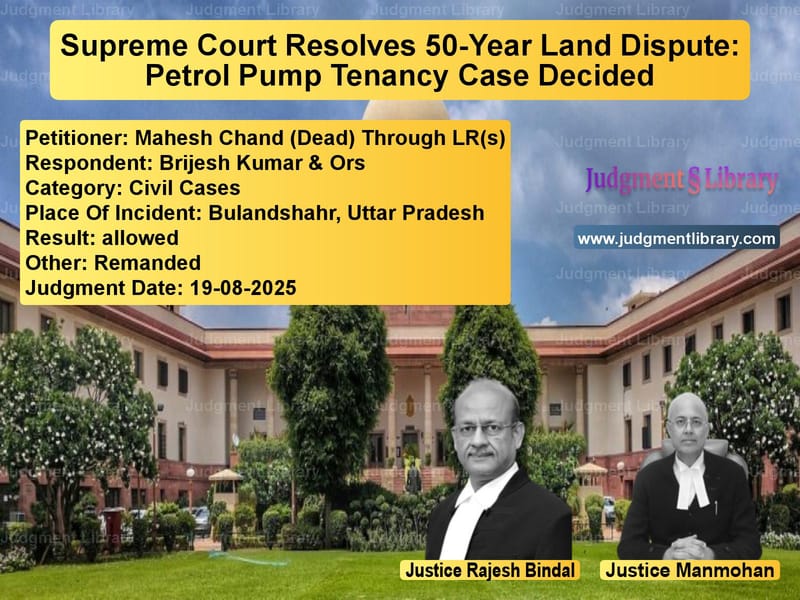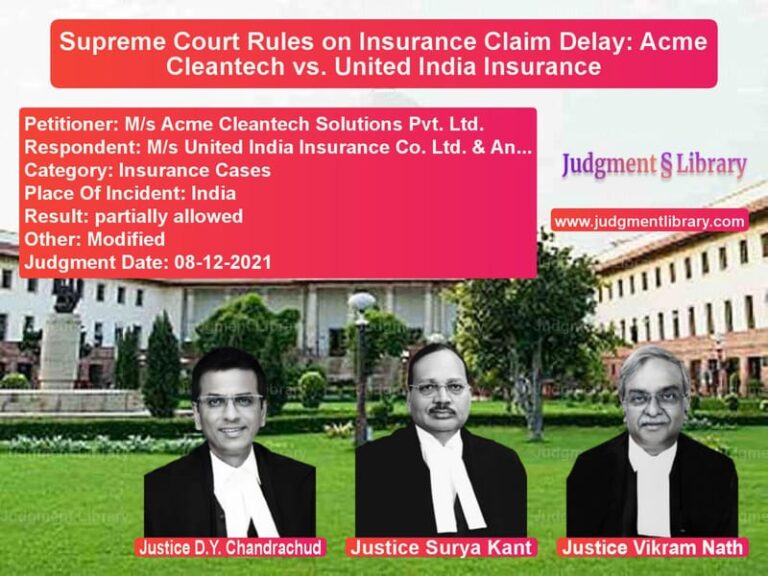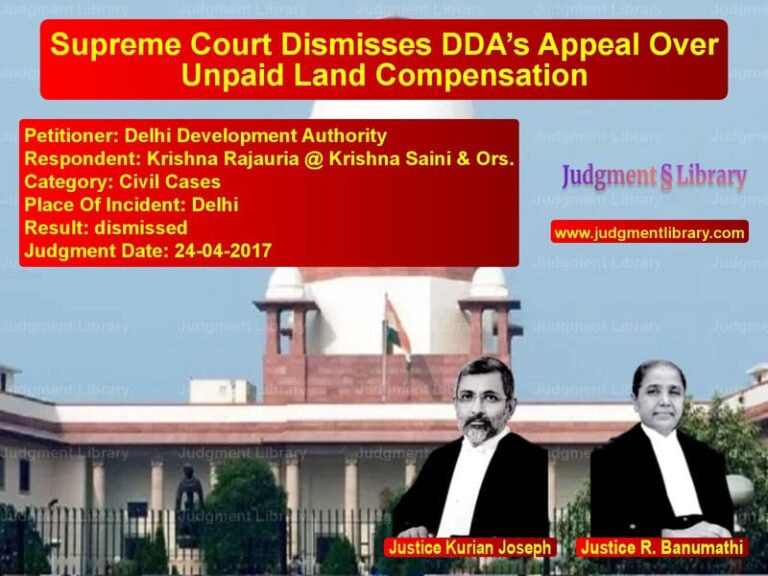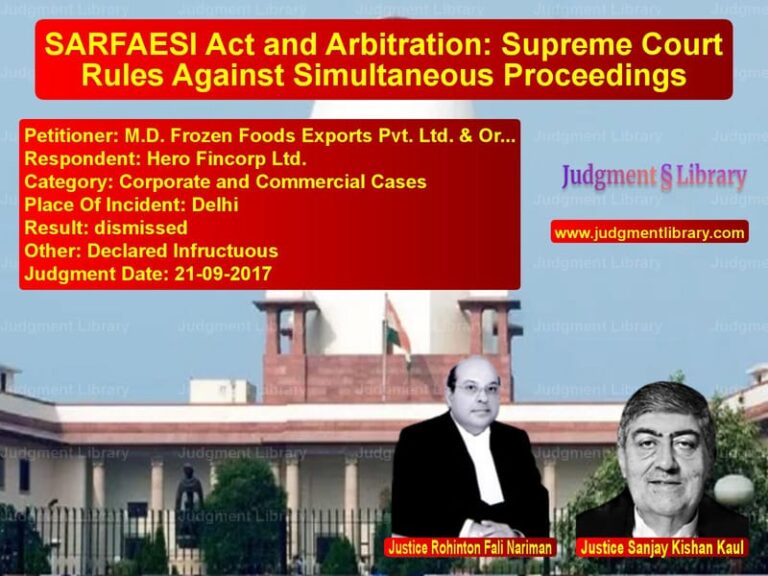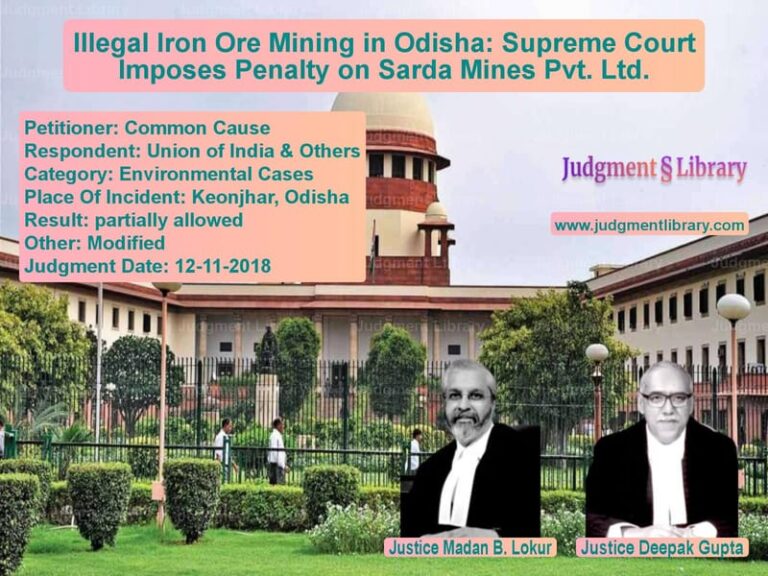Supreme Court Resolves 50-Year Land Dispute: Petrol Pump Tenancy Case Decided
In a landmark judgment that brings closure to a legal battle spanning over five decades, the Supreme Court of India has delivered a decisive verdict in a complex land dispute case involving a petrol pump tenancy. The case of Mahesh Chand vs Brijesh Kumar & Ors represents one of those rare legal sagas that test not just the patience of the parties involved but also the very foundations of procedural and substantive law. What began as a simple tenancy agreement in 1970 transformed into a protracted legal war, winding its way through various courts and finally reaching the nation’s highest judicial authority for resolution.
The origins of this dispute date back to July 31, 1970, when a registered tenancy agreement was signed between the parties. The predecessor-in-interest of respondents 1 to 3 took a portion of land on rent from the appellant at ₹150 per month with the specific purpose of setting up an Indian Oil petrol pump. The agreement clearly stipulated that failure to pay rent regularly would give the landlord the right to evict the tenant and recover arrears. Trouble began when the tenant stopped paying rent from July 1, 1972 onward, leading the landlord to file a suit for eviction in 1974.
The core legal issue that kept this case entangled in litigation for half a century revolved around a seemingly simple question: which court had jurisdiction to hear the eviction case? The tenants argued that the land was agricultural, and therefore only the Revenue Court could handle the matter under the Uttar Pradesh Zamindari Abolition and Land Reforms Act (UPZALR Act). The landlord maintained that since the land had been leased specifically for commercial purposes – to operate a petrol pump – the Civil Court had jurisdiction.
The arguments presented before the Supreme Court encapsulated the entire legal controversy. Learned counsel for the appellant submitted that “from the very beginning, the land in question was let out to the predecessor-in-interest of respondent nos.1 to 3, way back in the year 1970, for setting up of a petrol pump, which was non-agricultural purpose. Nothing lies in the mouth of the respondent nos.1 to 3 to claim that the land is agricultural, just with a view to defeat the rightful claim of the appellant.” He further emphasized the crucial development that “initial approval was granted by the competent authority under Section 143 of the UPZALR Act for use of land for non-agricultural purposes on 10.12.1975. However, after litigation, finally vide order dated 14.03.1986 passed by the Deputy Collector, Khurja, the land was declared non-agricultural. The same attained finality.”
The appellant’s counsel made a compelling procedural argument that “no doubt, civil suit for eviction was filed prior to aforesaid declaration of the land as non-agricultural. However, the nature of the land having been changed in terms of the provisions of UPZALR Act during the pendency of the proceedings, the suit filed by the appellant could not have been dismissed on account of jurisdiction as appeals are continuation of proceedings and subsequent events also have to be taken note of.”
On the other side, learned counsel for the respondent nos. 1 to 3 presented counter-arguments, submitting that “the declaration made by the competent authority under Section 143 of UPZALR Act is required to be registered in terms of Section 145 thereof. In the case in hand, there was no registration. Any declaration without registration is merely a paper, which cannot be relied upon to claim that the land was declared as non-agricultural. The declaration had to be on the date of filing of the suit.”
The Supreme Court, in its wisdom, cut through the procedural technicalities to focus on substantive justice. The Court made several crucial observations that formed the foundation of its judgment. The bench noted that “the basic facts that have been noticed above, which are not in dispute, are that a registered tenancy agreement was entered into between the parties on 31.07.1970. From day one, the land of the appellant was taken by the predecessor-in-interest of the respondent nos.1 to 3 for setting up of a petrol pump, which is a commercial and non-agricultural purpose.”
The Court emphasized the importance of considering subsequent developments in long-pending litigation, observing that “there is no quarrel on the proposition of law that appeal is continuance of proceedings and any developments which may take place during pendency of the appeal or suit, going to the root of the case, can always be taken notice of to avoid multiplicity of litigation. It remained an undisputed fact that finally vide order dated 14.03.1986, the land in question was declared non-agricultural.”
Addressing the technical objection raised by the respondents about registration of the declaration, the Court provided clarity: “His further argument that because of non-registration of the declaration of the section 143 of the Act, it was a waste paper and could not be relied upon, is also of no consequence. Section 145 of the UPZALR Act, on which reliance is sought to be placed, in support of the arguments, does not cast any duty on the land owner to get it registered. As per Section 145 of the UPZALR Act, it is the duty of the Assistant Collector-in-charge of the Sub-Division to forward a copy of the declaration made under Section 143 of the UPZALR Act to the Sub Registrar to do the needful. Such registration is to be made free of cost notwithstanding anything contained in the Indian Registration Act, 1908. Meaning thereby, no duty is cast on the appellant to get the same registered. Apparently, it is merely a procedure. No fee has to be paid as the relevant registration was free of cost. Merely on account of deficiency by the officers, the appellant cannot be deprived of the benefits of the declaration so made.”
The Supreme Court’s judgment demonstrates a pragmatic approach to justice administration, particularly in cases involving protracted litigation. The Court recognized that “in the case in hand, from the very beginning, vide registered tenancy agreement, the land was taken by the predecessor-in-interest of the respondent nos.1 to 3 for non-agricultural purposes. This fact also cannot be denied that on the date when the First Appellate Court passed the judgment on 27.07.1992, which was upheld by the High Court on 15.02.2024, the land in question had already been declared as non-agricultural under Section 143 of the UPZALR Act.”
The Court’s reasoning highlighted the absurdity that would result if technical objections were allowed to prevail over substantive justice: “After return of plaint in terms of judgment of the High Court dated 15.02.2024, the Revenue Court will not have the jurisdiction to entertain the lis, as the land has been declared non-agricultural during pendency of the litigation. The Civil Court has the jurisdiction to entertain the suit.”
In its final analysis, the Supreme Court allowed the appeal, setting aside the impugned judgment and decree passed by the High Court. Recognizing that the merits of the controversy had not been properly addressed by the lower appellate courts, the Court remitted the case back to the First Appellate Court for consideration on merits. Showing sensitivity to the extraordinary duration of the litigation, the Court specifically directed that “litigation being more than 50 years old, we direct the First Appellate Court to hear and decide the appeal within a period of six months from the date of receipt of the copy of this order.”
This judgment serves as an important precedent in Indian jurisprudence, particularly regarding the treatment of subsequent developments in long-pending cases and the interpretation of technical procedural requirements. The Supreme Court’s approach demonstrates that while procedures are important for ensuring orderly administration of justice, they should not become tools for denying substantive rights, especially when parties have acted in good faith and the factual matrix clearly supports their position.
The case also underscores the challenges faced by litigants in the Indian judicial system, where property disputes can span generations, consuming enormous resources and time. The Supreme Court’s intervention in this matter not only brings hope for the specific parties involved but also sets a benchmark for how courts should handle aged cases where technicalities threaten to override substantive justice.
Petitioner Name: Mahesh Chand (Dead) Through LR(s).Respondent Name: Brijesh Kumar & Ors.Judgment By: Justice Rajesh Bindal, Justice Manmohan.Place Of Incident: Bulandshahr, Uttar Pradesh.Judgment Date: 19-08-2025.Result: allowed.
Don’t miss out on the full details! Download the complete judgment in PDF format below and gain valuable insights instantly!
Download Judgment: mahesh-chand-(dead)-vs-brijesh-kumar-&-ors-supreme-court-of-india-judgment-dated-19-08-2025.pdf
Directly Download Judgment: Directly download this Judgment
See all petitions in Property Disputes
See all petitions in Landlord-Tenant Disputes
See all petitions in Contract Disputes
See all petitions in Damages and Compensation
See all petitions in Specific Performance
See all petitions in Judgment by Rajesh Bindal
See all petitions in Judgment by Manmohan
See all petitions in allowed
See all petitions in Remanded
See all petitions in supreme court of India judgments August 2025
See all petitions in 2025 judgments
See all posts in Civil Cases Category
See all allowed petitions in Civil Cases Category
See all Dismissed petitions in Civil Cases Category
See all partially allowed petitions in Civil Cases Category

